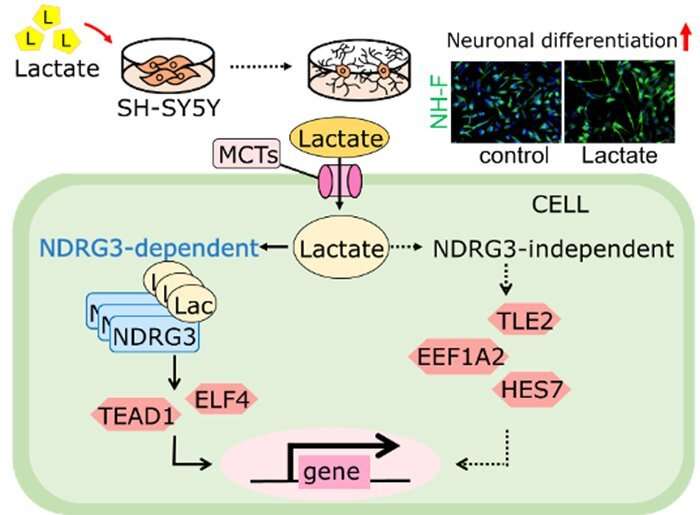This article has been reviewed according to Science X's editorial process and policies. Editors have highlighted the following attributes while ensuring the content's credibility:
fact-checked
peer-reviewed publication
trusted source
proofread
Researchers identify critical role lactate plays in neural cell development

Scientists at Tohoku University have discovered the critical role that lactate plays in helping neural stem cells develop into specialized neurons, a process dubbed neuronal differentiation. They also unearthed a means by which lactate sends signals to the cells, helping modify and strengthen neuronal functions.
Details of their study were reported in the Journal of Biological Chemistry.
Lactate is a byproduct of exercise and metabolism. Glucose gets converted into lactate when oxygen supplies to cells are limited, giving the brain a source of energy. Lactate levels in fetal brains increase from the middle state of gestation, highlighting the significant role it has in brain development and neuronal differentiation.
Recent studies and reports have demonstrated that lactate is a vital component of our nervous system. They have shown that lactate functions as an important cellular signaling molecule in the nervous system, and that lactate metabolism is involved in neuronal functions, including neuroplasticity and memory consolidation. However, the role of lactate signaling in neuronal cells has, until now, remained unknown.
"Given the growing evidence that shows lactate providing signal-regulatory functions in various cell types under physiological and pathological conditions, we hypothesized that lactate affects neuronal function through changing comprehensive gene expression," says Professor Ryoichi Nagatomi from Tohoku University's Graduate School of Biomedical Engineering and leader of the research team along with Ph.D. student Yidan Xu and Associate Professor Joji Kusuyama from Tokyo Medical and Dental University.
The researchers tested their hypothesis by examining the gene regulation of cells treated with lactate when NDRG3, a protein previously identified to mediate gene regulation when lactate is present, was removed from neuroblastoma cell SH-SY5Y. They found that lactate helps with neural differentiation through ways that depend on NDRG3 and ways that don't. Additionally, they identified that two specific transcription factors, TEAD1 and ELF4, are controlled by both lactate and NDRG3 during neuronal differentiation.
Nagatomi and his team believe their findings not only further basic knowledge of lactate, but could serve as a basis for harnessing lactate signaling for encouraging exercise or designing drugs as a way to prevent or control cognitive diseases. "Our findings provide a novel insight into the mechanisms by which exercise-induced high serum lactate levels may beneficially affect the nervous system.
"Furthermore, since the changes in lactate levels caused by human exercise can be measured, the adaptational changes in the brain function such as cognition and memory function can be better understood when changes in the lactate level is considered," Nagatomi says.
Looking ahead, the team plans to further investigate the regulatory function of lactate in neuron and brain development.
More information: Yidan Xu et al, Lactate promotes neuronal differentiation of SH-SY5Y cells by lactate-responsive gene sets through NDRG3-dependent and -independent manners, Journal of Biological Chemistry (2023). DOI: 10.1016/j.jbc.2023.104802
Journal information: Journal of Biological Chemistry
Provided by Tohoku University





















